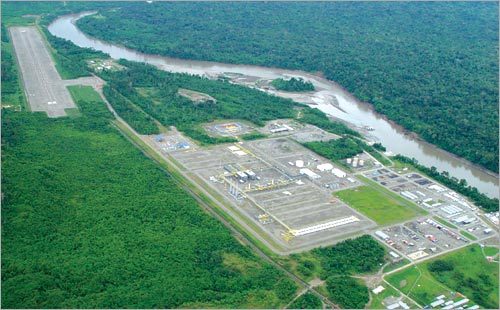Swedish pension fund blacklists Korean firm for alleged human rights abuses in Peru
By Son Ji-hyoungPublished : June 22, 2020 - 16:00

Swedish public pension fund AP7 has added SK Holdings, a South Korean company at the apex of SK conglomerate’s governance structure, to its blacklist of companies to be excluded from its investment universe, its recent report showed Monday.
SK Holdings was one of three firms added in the latest move, along with Canadian cannabinoid firm Cronos Group and Egyptian electrical company Elsewedy Electric, according to the blacklist updated as of June 15.
According to the report by the institutional investor, with 525 billion Swedish krona ($55.54 billion) in assets under management as of end-March, SK Holdings’ exclusion is attributable to an “involvement in the violation of human rights in a gas extraction project in Peru,” apparently referring to the controversial Camisea gas project that had reportedly affected the reserve in the remote forested area for uncontacted Indigenous peoples, leaving them exposed to health epidemics from the outside world and a shortage of clean water.
AP7 said the move is in line with its intention to invest in companies “that in an acceptable way adhere to the international norms and conventions signed by Sweden,” following principles by the UN Global Compact and Paris Agreement to the UN Climate Convention.
SK Holdings became the sixth Korean company to be blacklisted, following Hanwha, Korea Shipbuilding & Offshore Engineering -- parent company of Hyundai Heavy Industries -- Posco, Posco International and SK Innovation.
SK Holdings owns a 33.4 percent stake in SK Innovation, a gas refiner that took part in the multinational gas concession in Peru‘s remote area led by Pluspetrol. The consortium has produced gas from Camisea gas fields, carried the gas through the 540-kilometer pipeline that traverses through the Andes mountains to the port of Pisco in western Peru.
Pluspetrol, along with the Peruvian Energy Ministry, faced a lawsuit in 2014 demanding a ban on exploitation of oil and gas operations in a reserve. The Indigenous peoples also launched a legal battle against Pluspetrol in the Netherlands in March.
SK Innovation and its consortium partner Repsol were blacklisted by AP7 in 2016.
SK Innovation in September inked a deal with Pluspetrol to sell its 17.6 percent stake in two gas fields there to the Argentine firm for $1.05 billion. The transaction is awaiting Peruvian authorities’ approval, according to SK Innovation’s latest regulatory filing.
“SK Innovation has been sincerely addressing AP7‘s concerns surrounding the Peruvian gas project,” a SK Holdings spokesperson told The Korea Herald. “Upon completion of the stake divestment from the gas fields, we expect (both SK Holdings and SK Innovation) to be reincluded in AP7’s investment universe.”
By Son Ji-hyoung (consnow@heraldcorp.com)
SK Holdings was one of three firms added in the latest move, along with Canadian cannabinoid firm Cronos Group and Egyptian electrical company Elsewedy Electric, according to the blacklist updated as of June 15.
According to the report by the institutional investor, with 525 billion Swedish krona ($55.54 billion) in assets under management as of end-March, SK Holdings’ exclusion is attributable to an “involvement in the violation of human rights in a gas extraction project in Peru,” apparently referring to the controversial Camisea gas project that had reportedly affected the reserve in the remote forested area for uncontacted Indigenous peoples, leaving them exposed to health epidemics from the outside world and a shortage of clean water.
AP7 said the move is in line with its intention to invest in companies “that in an acceptable way adhere to the international norms and conventions signed by Sweden,” following principles by the UN Global Compact and Paris Agreement to the UN Climate Convention.
SK Holdings became the sixth Korean company to be blacklisted, following Hanwha, Korea Shipbuilding & Offshore Engineering -- parent company of Hyundai Heavy Industries -- Posco, Posco International and SK Innovation.
SK Holdings owns a 33.4 percent stake in SK Innovation, a gas refiner that took part in the multinational gas concession in Peru‘s remote area led by Pluspetrol. The consortium has produced gas from Camisea gas fields, carried the gas through the 540-kilometer pipeline that traverses through the Andes mountains to the port of Pisco in western Peru.
Pluspetrol, along with the Peruvian Energy Ministry, faced a lawsuit in 2014 demanding a ban on exploitation of oil and gas operations in a reserve. The Indigenous peoples also launched a legal battle against Pluspetrol in the Netherlands in March.
SK Innovation and its consortium partner Repsol were blacklisted by AP7 in 2016.
SK Innovation in September inked a deal with Pluspetrol to sell its 17.6 percent stake in two gas fields there to the Argentine firm for $1.05 billion. The transaction is awaiting Peruvian authorities’ approval, according to SK Innovation’s latest regulatory filing.
“SK Innovation has been sincerely addressing AP7‘s concerns surrounding the Peruvian gas project,” a SK Holdings spokesperson told The Korea Herald. “Upon completion of the stake divestment from the gas fields, we expect (both SK Holdings and SK Innovation) to be reincluded in AP7’s investment universe.”
By Son Ji-hyoung (consnow@heraldcorp.com)








![[KH Explains] How should Korea adjust its trade defenses against Chinese EVs?](http://res.heraldm.com/phpwas/restmb_idxmake.php?idx=644&simg=/content/image/2024/04/15/20240415050562_0.jpg&u=20240415144419)











![[Today’s K-pop] Stray Kids to return soon: report](http://res.heraldm.com/phpwas/restmb_idxmake.php?idx=642&simg=/content/image/2024/04/16/20240416050713_0.jpg&u=)